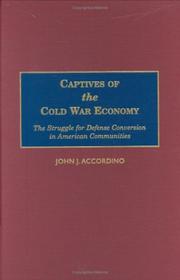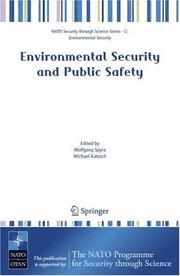| Listing 1 - 3 of 3 |
Sort by
|

ISBN: 0275965619 0313000816 9780313000812 9780275965617 9798400623332 Year: 2000 Publisher: Westport, Conn. Praeger
Abstract | Keywords | Export | Availability | Bookmark
 Loading...
Loading...Choose an application
- Reference Manager
- EndNote
- RefWorks (Direct export to RefWorks)
TECHNOLOGY & ENGINEERING --- Military Science --- Business & Economics --- Economic History --- Military base conversion --- Economic conversion --- Defense industries --- Armaments industries --- Arms sales --- Military sales --- Military supplies industry --- Munitions --- Sale of military equipment --- Conversion of military bases --- Military bases --- Conversion --- Industries --- Arms transfers
Book
ISBN: 1501739778 9781501739774 9781501739781 1501739786 9781501700064 Year: 2019 Publisher: Ithaca [New York]
Abstract | Keywords | Export | Availability | Bookmark
 Loading...
Loading...Choose an application
- Reference Manager
- EndNote
- RefWorks (Direct export to RefWorks)
American communities face serious challenges when military bases close. But affected municipalities and metro regions are not doomed. Taking a long-term, flexible, and incremental approach, Michael Touchton and Amanda J. Ashley make strong recommendations for collaborative models of governance that can improve defense conversion dramatically and ensure benefits, even for low-resource municipalities. Communities can't control their economic situation or geographic location, but, as Salvaging Community shows, communities can control how they govern conversion processes geared toward redevelopment and reinvention.In Salvaging Community, Touchton and Ashley undertake a comprehensive evaluation of how such communities redevelop former bases following the Department of Defense's Base Realignment and Closure (BRAC) process. To do so, they developed the first national database on military redevelopment and combine quantitative national analyses with three, in-depth case studies in California. Salvaging Community thus fills the void in knowledge surrounding redevelopment of bases and the disparate outcomes that affect communities after BRAC. The data presented in Salvaging Community points toward effective strategies for collaborative governance that address the present-day needs of municipal officials, economic development agencies, and non-profit organizations working in post-BRAC communities. Defense conversion is not just about jobs or economic rebound, Touchton and Ashley argue. Emphasizing inclusion and sustainability in redevelopment promotes rejuvenated communities and creates places where people want to live. As localities and regions deal with the legacy of the post-Cold War base closings and anticipate new closures in the future, Salvaging Community presents a timely and constructive approach to both economic and community development at the close of the military-industrial era.
Community development --- Military base conversion --- Conversion of military bases --- Military bases --- Economic conversion --- Regional development --- Economic assistance, Domestic --- Social planning --- Conversion --- Citizen participation --- Government policy --- BRAC. --- defense conversion. --- economic development. --- government conversion. --- military-industry era. --- E-books

ISSN: 18724668 ISBN: 9781402056420 1402056427 1402056435 9786610817252 1280817259 1402056443 Year: 2007 Publisher: Dordrecht, Netherlands ; London, England : Springer,
Abstract | Keywords | Export | Availability | Bookmark
 Loading...
Loading...Choose an application
- Reference Manager
- EndNote
- RefWorks (Direct export to RefWorks)
Although the end of the Cold War has paved the way to a substantial demilitarisation and conversion, the leftovers of this process – such as former military installations, military training areas, and huge quantities of unserviceable ammunition and equipment – still pose a severe threat to the environment of both NATO and Partner countries. The rehabilitation of these areas for civilian uses is extremely costly and is generally in the short and medium term not possible. For this reason, the development of new methods for the estimation avoidance of risks should receive special priority. In the context of this ARW, the reconnaissance and appraisal of conversion areas with respect to costs, returns, and legal considerations were discussed. The decades-long use of some areas led to the heavy loading of contaminates. Every task of conversion has as its goal the elimination of dangers to humans and nature, and the return of areas to civil use, such that these areas can be used realise economic interests of the society.
Military base conversion --- Environmental protection --- Accidents --- Environnement --- Environmental aspects --- Congresses --- Prevention --- Protection --- Congrès --- Military base conversion. --- Environmental Engineering --- Civil & Environmental Engineering --- Engineering & Applied Sciences --- Conversion of military bases --- Military bases --- Common accidents --- Injuries --- Conversion --- Political science. --- Architecture. --- Pollution. --- Environmental pollution. --- Political Science and International Relations. --- Political Science. --- Pollution, general. --- Terrestrial Pollution. --- Cities, Countries, Regions. --- Economic conversion --- Diseases --- First aid in illness and injury --- Violent deaths --- Disasters --- Emergencies --- Causes and theories of causation --- Chemical pollution --- Chemicals --- Contamination of environment --- Environmental pollution --- Pollution --- Contamination (Technology) --- Asbestos abatement --- Bioremediation --- Environmental engineering --- Environmental quality --- Factory and trade waste --- Hazardous waste site remediation --- Hazardous wastes --- In situ remediation --- Lead abatement --- Pollutants --- Refuse and refuse disposal --- Administration --- Civil government --- Commonwealth, The --- Government --- Political theory --- Political thought --- Politics --- Science, Political --- Social sciences --- State, The --- Architecture, Western (Western countries) --- Building design --- Buildings --- Construction --- Western architecture (Western countries) --- Art --- Building --- Design and construction
| Listing 1 - 3 of 3 |
Sort by
|

 Search
Search Feedback
Feedback About UniCat
About UniCat  Help
Help News
News